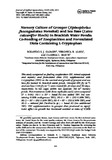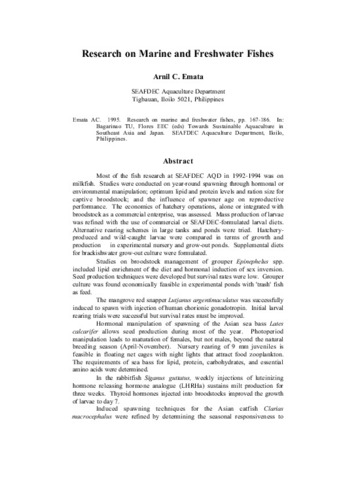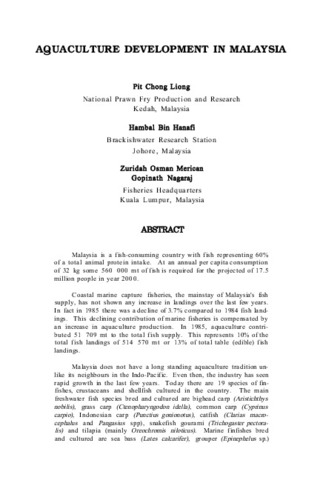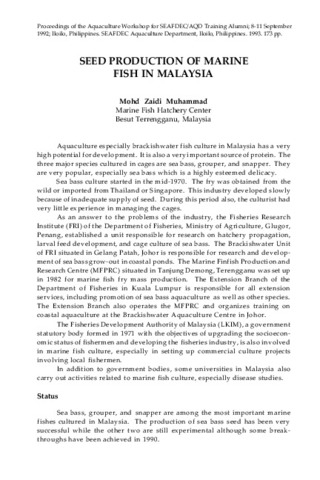Nursery culture of grouper (Epinephelus fuscoguttatus Forsskal) and sea bass (Lates calcarifer Bloch) in brackish water ponds: Co-feeding of zooplankton and formulated diets containing L-tryptophan
Share
Abstract
This study compared co-feeding zooplankton (ZP, mixed copepods and mysids) and formulated diets (FD) supplemented with L-tryptophan (TRP) on the survival and growth of grouper and sea bass fry nursed in brackish water ponds. Grouper (84 fry m−3) and sea bass (150 fry m−3) were reared for 30 days and 60 days, respectively, in net cages within two separate 743 m2 nursery ponds. Five treatments (with three replicates each) were compared (P < 0.05): FD-1 = ZP + basal FD (no added TRP, but containing 0.29% endogenous TRP); FD-2 = ZP + (FD 0.58% TRP); FD-3 = ZP + (FD 1.22% TRP); FD-4 = ZP + (FD 2.50% TRP); and FD-5 = minced fish (Sardinella sp.) + basal FD (no additional TRP). TRP supplementation in grouper diets produced no significant affect on growth but increased survival at rates of 0.58% and above. TRP supplementation at 2.5% (FD-4) produced significantly better sea bass growth than other diets but had no affect on survival. Zooplankton improved both survival and growth in both grouper and sea bass juveniles compared to the minced fish diet, and may be a practical and lower cost alternative to indoor nursing.
Suggested Citation
Gapasin, R. S. J., Alava, V. R., & Marte, C. L. (2012). Nursery culture of grouper (Epinephelus fuscoguttatus Forsskal) and sea bass (Lates calcarifer Bloch) in brackish water ponds: Co-feeding of zooplankton and formulated diets containing L-tryptophan. Journal of Applied Aquaculture , 24(3), 221-234. https://doi.org/10.1080/10454438.2012.679146
Subject
Taxonomic term
Collections
- AQD Journal Articles [1249]
Related items
Showing items related by title, author, creator and subject.
-
Research on marine and freshwater fishes
Emata, Arnil C. (Aquaculture Department, Southeast Asian Fisheries Development Center, 1995)Most of the fish research at SEAFDEC AQD in 1992-1994 was on milkfish. Studies were conducted on year-round spawning through hormonal or environmental manipulation; optimum lipid and protein levels and ration size for ... -
Aquaculture development in Malaysia
Liong, Pit Chong.; Hanafi, Hambal Bin.; Merican, Zuridah Osman.; Nagaraj, Gopinath. (Aquaculture Department, Southeast Asian Fisheries Development Center, 1988)Malaysia is a fish-consuming country with fish representing 60% of a total animal protein intake. At an annual per capita consumption of 32 kg some 560 000 mt of fish is required for the projected of 17.5 million people ... -
Seed production of marine fish in Malaysia
Muhammad, Mohd Zaidi (Aquaculture Department, Southeast Asian Fisheries Development Center, 1993)Aquaculture especially brackishwater fish culture in Malaysia has a very high potential for development. It is also a very important source of protein. The three major species cultured in cages are sea bass, grouper, and ...




